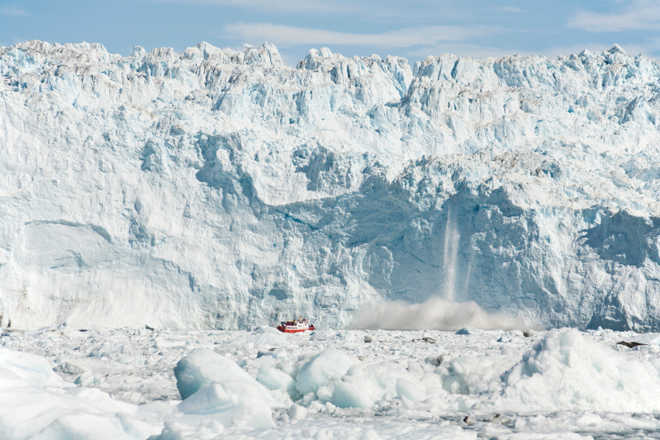
Eqi glacier, Greenland
LONDON: Providing a vital clue to the future of Greenland, scientists have measured how the island's ice sheet reacted to a warm period 8,000 to 5,000 years ago when the temperatures were two to four degrees Celsius warmer than present.
While the world is gearing up for a rising global sea level, scientists have studied how fast the Greenland Ice Sheet reacted to past warming.
"It has been hard work getting all these lake cores home, but has definitely been worth the effort. Finally we are able to describe the ice sheet's response to earlier warm periods," said Nicolaj Krog Larsen of Aarhus University, Denmark.
The lakes act as a valuable archive as they store glacial meltwater sediments in periods where the ice is advanced.
The size of Greenland Ice Sheet has varied since the Ice Age ended 11,500 years ago.
The glaciers always leave evidence about their presence in the landscape.
"So far the problem has just been that the evidence is removed by new glacial advances. That is why it is unique that we are now able to quantify the mass loss during past warming by combining the lake sediment records with state-of-the-art modelling," said professor Kurt Kjaer from Natural History Museum, Denmark.
The ice had its smallest extent exactly during the warming 8,000 to 5,000 years ago and this information has helped the team to review all available ice sheet models.
The best models show that during this period the ice sheet was losing mass at the rate of 100 Gigaton per year for several thousand years.
They delivered the equivalent of 16 cm of global sea level rise when the temperatures were two to four degrees Celsius warmer.
For comparison, the mass loss in the last 25 years has varied between 0 to 400 Gigaton per year, and it is expected that the Arctic will warm two to seven degrees Celsius by the year 2100.
The study appeared in the scientific journal Geology. — IANS



























